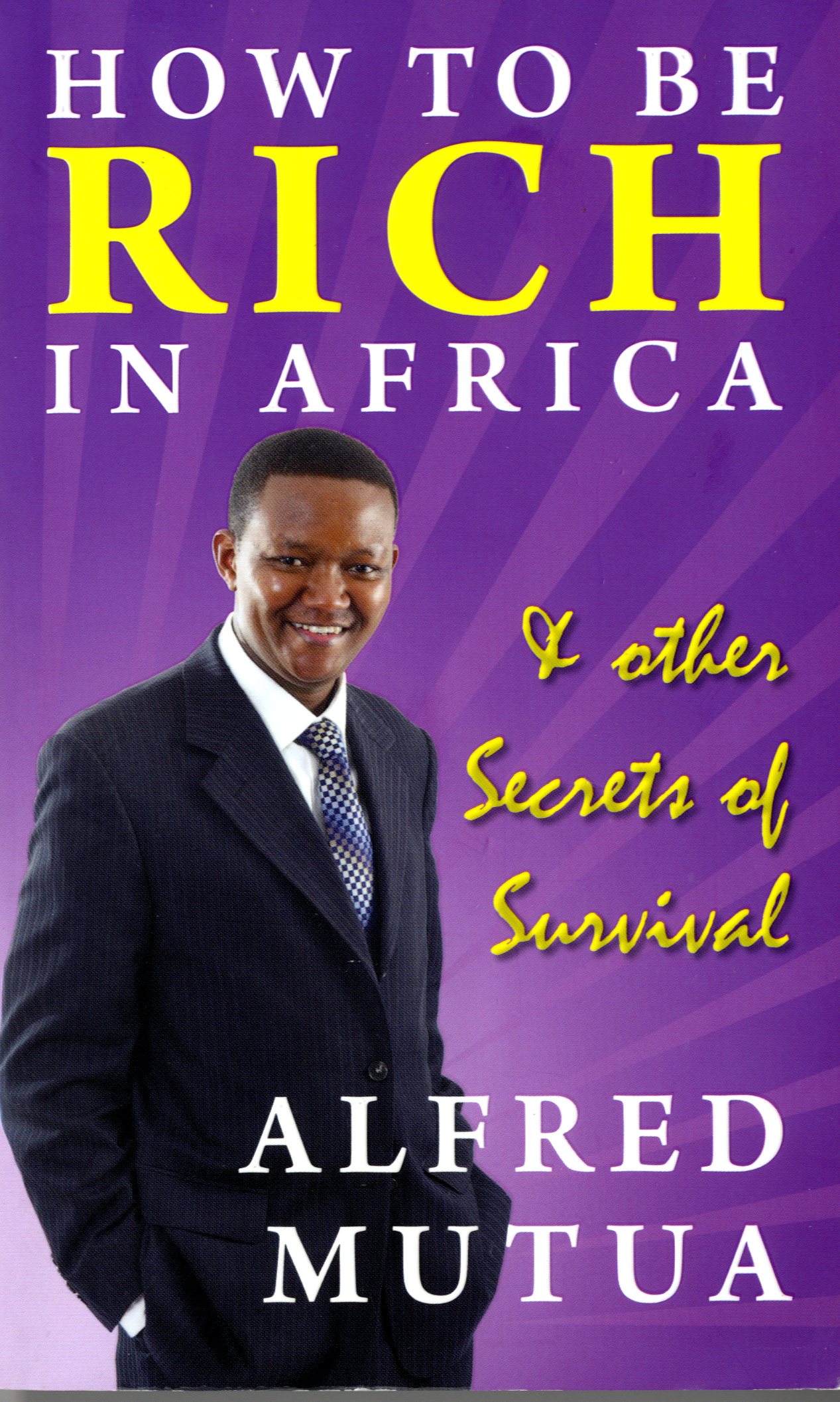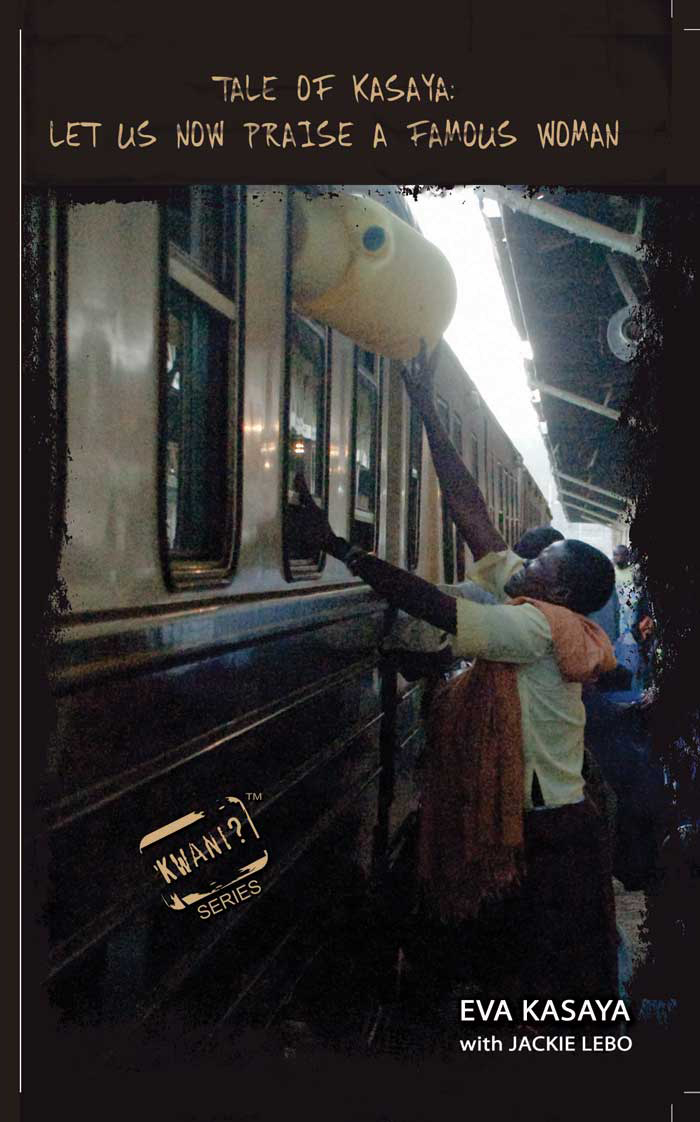Kenyan publishers: The weak link in Kenyan writing?
A Paper presented at an international seminar on Historical Legacy and Contemporary Writing in the Commonwealth, held in New Delhi from 8-10 October.
By JOSEPH NGUNJIRI
Just like the old woman in the Igbo proverb gets uneasy when dry bones are mentioned so does East Africa and Kenya in particular, whenever the phrase literary desert is invoked.
It is indeed interesting that more than 30 years after Taban lo Liyong issued his infamous edict, Kenya has not done much to disprove the controversial Sudanese writer.
Compared to Southern and Western African writers, Kenya, and the Easter African region still have a long way to go in terms of creative writing. You can easily tell this by the fact that most literary prizes in Africa keep ending up in the hands of either Southern or Western Africans.
This is ironical because Kenya has one of the most advanced publishing sectors in Africa aside from South Africa. However, a careful look at publishing houses in Kenya reveals that they dedicate their energies to the lucrative textbook market.
It has been argued that Kenyan publishers only publish a general readership books as an afterthought, and even then, they do not market them well.
When Henry ole Kulet’s book Blossoms of the Savannah won the Jomo Kenyatta Prize for Literature in 2009, such was his frustration when readers could not access copies of the book from bookshops.
And in my case, when my book Henry Wanyoike: Victory Despite Blindness came out in October last year, it took more than six months before it could get to Textbook Centre, the largest book distributor in Kenya.
And when recently, the subject of my book, a blind Olympic champion and multiple world record holder appeared in a radio talk show to promote the book, callers to the station said they could not get the book in their local bookshops.
Textbooks on the other hand require little or no marketing at all. Once your book has been approved by the Kenya Institute of Education (KIE) you only need to deliver them to booksellers and schools will make their orders. Of course there is the small bit of going round schools trying to convince teachers that your book is better than the others in the market.
In short marketing departments of Kenyan publishers are comprised of glorified salespeople who spend most of their time hustling school teachers.
About four months ago Kenyan publishers got a major scare when KIE, in a report, indicated that it intended to go back into the publishing of textbooks. Had this come to pass, publishers would have lost more than 70 per cent of their revenue, with the stroke of a pen.
It later emerged that the KIE report was heavily doctored, and that it was only after the mouth watering monies involved in school publishing. If there was a lesson to be learnt by Kenyan publishers then it was that they need not put all their eggs in one basket. But has the lesson been learnt? Only time will tell.
So reliant are publishers on the school market that even when they publish a work of fiction it is in the hope that KIE will adopt it as a set book, thereby guaranteeing them handsome sales. Rarely do they target the mass market.
It estimated that the textbook market potential in Kenya has been exploited up to 70 per cent, while that of non-textbooks stands at a mere 30 per cent, which means that there is a large untapped potential for non-textbooks in the country, and which publishers are unwilling to exploit.
When David Waweru established WordAlive Publishers in 2001, players in the industry laughed when he told them that he wanted to do Christian and motivational books. Today, nine years down the line the same publishers who laughed at him seek his services in terms if book packaging and marketing.
So successful has WordAlive been in those nine short years that when top biblical scholars from Africa wrote the Africa Bible Commentary, WordAlive was chosen to be its publisher in Africa.
WordAlive marked another milestone when Eyo one of its fictional titles was nominated for the prestigious Commonwealth Writers Prize for Africa, in 2010. The book was written, not by a Kenyan author but by a Nigerian writer!
The only WordAlive book that targets the school market is the Student Companion Bible.
And speaking of literary awards; this year’s Wahome Mutahi Literary Prize, was won by Ng’ang’a Mbugua, a journalist who decided to self-publish his book Terrorists of the Aberdare, after mainstream publishers turned it down.
There had been a precedent, another self-published effort, Grapevine Stories had won the Jomo Kenyatta Prize for Literature in 1997. It is only then that a publisher agreed to adopt it.
And when Penguin South Africa launched its inaugural Writers Prize for Africa, for unpublished manuscripts, one of the nominees in the fiction category was Kenyan Moraa Gitaa. Moraa’s manuscript had severally been rejected by publishers in the country. One of them accused her of having a “wild imagination”.
When Ngugi wa Thiong’o was in Kenya to launch his latest book Dreams in a Time of War: A Childhood Memoir, he urged writers not to shy away from self-publishing their books, if that is the only way to get their works into the market.
Ngugi defended publishers’ decision to concentrate on textbooks, arguing that as business entities they exist to make money.
He however said that it is the duty of African publishers to nurture and market young writers.
When I asked Ngugi why there hasn’t been young writers coming up to fill his shoes he said that he did not wish to pass negative judgment. “There are enough young writers today,” he said. “We might not see a lot of their works at the moment, but I believe they are working on something.”
He pointed out Kwani? as a group of young Kenyan writers with whom he has a lot of faith.
It is interesting that Kwani? should now be getting their legitimacy from Ngugi. When Binyavanga Wainaina founded Kwani? in 2003 after winning the Caine Prize for African Writing, in 2002, such was the buzz that accompanied it that many people felt a true Kenyan writing renaissance was unfolding before them.
So fired up were they that, among other things, they said that the writing by the Ngugi generation was outdated, and that they needed to step aside and let fresh new talent show the way.
When Vyonne Awuor, another of the Kwani? generation of writers won the Caine Prize in 2003, the general feeling was that these young writers at least knew what they were doing. Seven years after Kwani? was formed Kenyans are still waiting to read the first novel written by a member of Kwani?
By comparison Chimamanda Ngozi Adichie was only a nominee when Binyavanga won the Caine Prize in 2002. Today Chimamanda has written two highly acclaimed novels, Purple Hibiscus and Half of a Yellow Sun. The latter went ahead to win the Orange Prize. Chimamanda has been hailed as Chinua Achebe’s literary daughter.
Helon Habila is the other exciting young Nigerian writer. Thus Chinua Achebe and Wole Soyinka can rest easy in the knowledge that they have worthy inheritors of their mantles.
Back in Kenya, the Ngugi succession might take a little longer. And as he says we should be more patient.
Category: Reviews
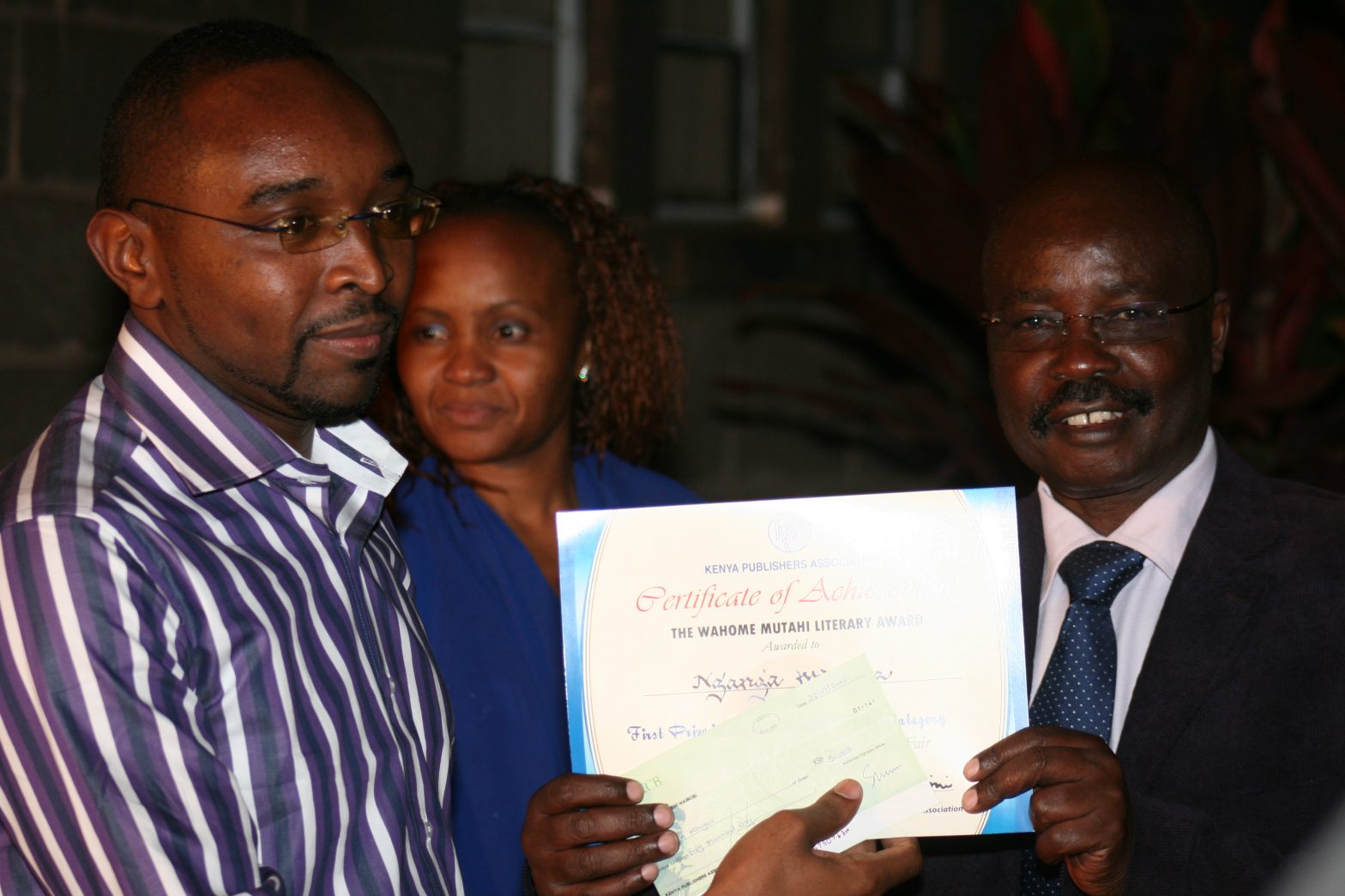
Ng’ang’a Mbugua’s novella, Terrorist of the Aberdare has won the third edition of the Wahome Mutahi Literary Award, while John Habwe’s book Cheche za Moto won the Kiswahili category of the same prize. The awarding ceremony was the highlight of the 13th edition of the Nairobi International Book Fair.
An elated Ng’ang’a Mbugua, who is also the chief sub-editor of Daily Nation, says that the win has vindicated his edition to self-publish the book. “I presented the manuscript of this book to several publishers and they turned it down,” an elated Ng’ang’a told Maisha Yetu. “Since I had faith in the book I formed Big Books, took a small loan and published the book.”
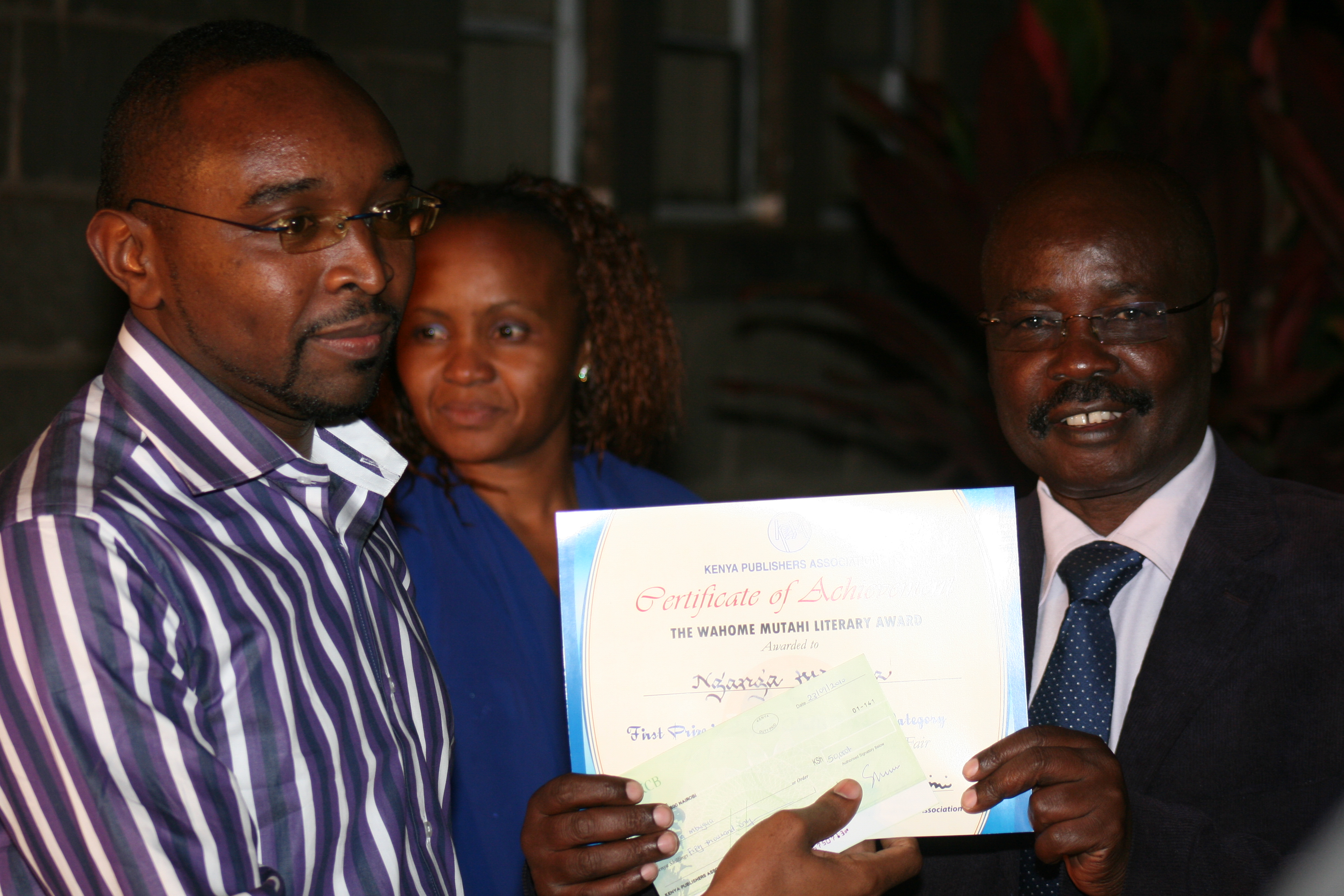
Ng’ang’a’s example shows that there is indeed life after publishers slam the door on a writer. I can imagine how the publishers who rejected the manuscript felt after Ng’ang’a stood to receive his prize. “Were we that blind?” they must have been asking themselves. And what does this say about the judgment of publishers who were given the chance to publish this book, and they rejected it? Should we start questioning their competence?
How many more potential winners are publishers sitting on? not to mention the ones they have rejected?
You might be wondering what Terrorist of the Aberdare is all about, whether it has anything to do with America’s old enemy, Osama bin Laden. Having read the book I can assure you that it has nothing to with Osama’s brand of terrorism. It talks about a different kind of terrorist: it is about elephants that cause havoc to farmers’ crops
These elephants leave the park and come to destroy farmers’ crops. Apart from that they also kill farmers who stand in their way. In Ng’ang’a’s book the victim of the elephant’s terrorism happens to be one Sonko Wakadosi, who was dispatched to his Maker by a rogue elephant. The author manages to address the serious issues of human wildlife conflict and environmental management by employing humour.
For the last few days Kenyans have been riveted by the exploits of one Mike Mbuvi ‘Sonko’, who trounced ODM’s Reuben Ndolo and PNU’s Dick Wathika to clinch the Makadara parliamentary seat in Nairobi. While talk about Sonko (rich man in Sheng) has revolved around his seemingly endless riches, the Sonko in Ng’ang’a’s book is dirt poor, and whose hope of striking it rich was through the sale of the cabbages so beloved of the elephants.
For his trouble Ng’ang’a takes home Ksh50,000 (625USD). But for Ng’ang’a money is the issue. it is about the recognition that comes with the win. “I plan to ride on the publicity generated by the win to really market my book,” says Ng’ang’a, whose company has already published a short story The Last Kiss, which is doing relatively well in the market.
Even before the award Ng’ang’a says that Terrorist of the Aberdare has done well in the short time it has been in the market, and that he has managed to recoup the money he invested in publishing the book.
The first edition of the Wahome Mutahi Prize was won by Onduko bw’ Atebe’s Verdict of Death, in 2006, while activist Okoiti Omtata’s play Voice of the People, won the prize in 2008.
Ng’ang’a has written other books including Mwai Kibaki: Economist for Kenya, (Sasa Sema) Catherine Ndereba: Marathon Queen (Sasa Sema), Susana the Brave (Focus), among others.
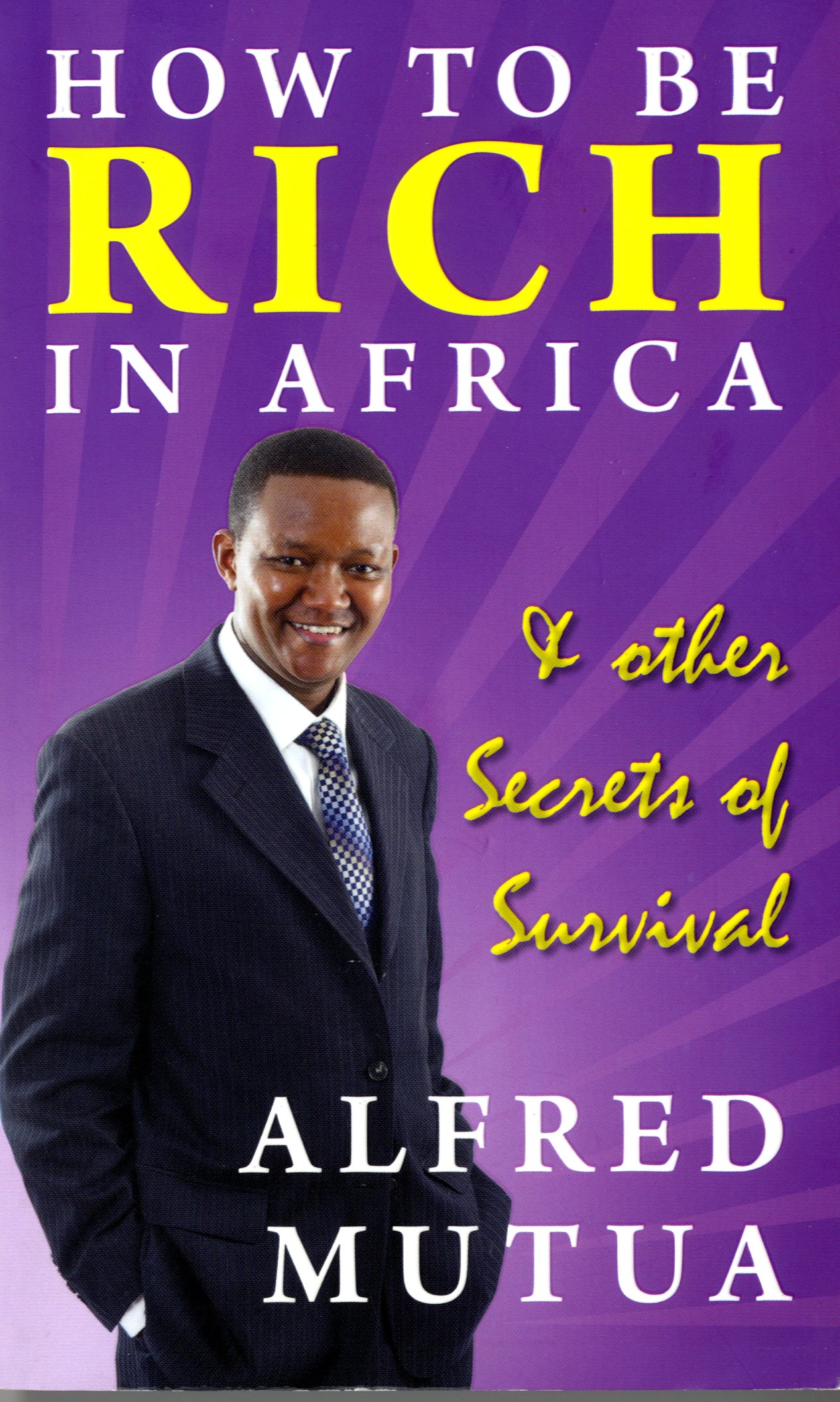
Ever since I heard that Kenya’s government spokesman Alfred Mutua has written a book on, wait for it, How to be rich in Africa, I knew something was amiss somewhere. With all due respect Mutua was the last person I expected to write on such a topic. He must have hustled his way to a top position in government, but he is not the ideal example of a wealthy person, leave alone claiming to advice people on how to make money.
I firmly believe what he has achieved is largely due to his influential position in government and not as a result of any any business acumen. But that is not to say that he is not a brilliant man. I will however refrain from going any deeper into the book before reading it. My interest in his book was renewed after I read its review written by Evan Mwangi in the Business Daily today. This is one of the most interesting reviews I have read in a long time. The reviewer pulled no punches.
“I bought my copy of his (Alfred Mutua’s) How to be Rich in Africa and other Secrets of Survival in Africa in a fancy bookshop in Nairobi and got disappointed immediately for spending my Sh600 on such a book,” writes Mwangi. “My instinct was to throw the book in a trash can together with my used paper towels or return it to the bookstore without claiming my money back.”
That is harsh you might say, but then wait till you hear this; “My ultimate take away lesson is: never let any shilling from your grasp. If by mistake you happen to buy a useless book, don’t be tempted to throw it away in anger. Review it for the best-paying newspaper before selling it to recoup some of your losses.” – emphasis mine.
You can read the rest of Mwangi’s review here.
Unlike Mwangi, I am not willing to risk my sh600 – I have better use for my money – I don’t have much! A colleague has promised to lend me his copy. I will go through it and post my review here. so watch this space…
Dreams in a time of war
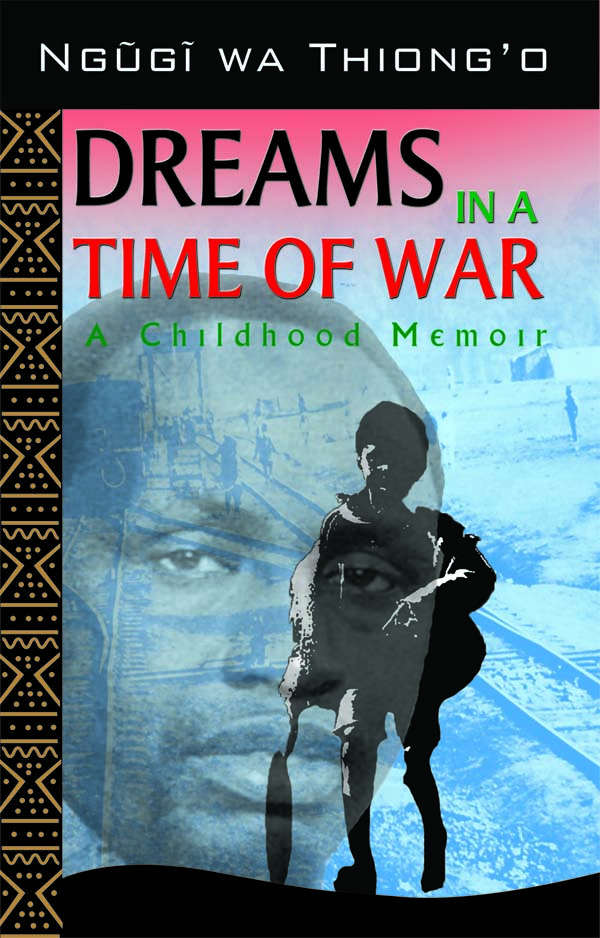
As a little boy growing up in Limuru, writer Ngugi wa Thiong’o was, one night, woken up by his mother to meet some ‘visitors’. Young Ngugi was pleasantly surprised to find that one of the visitors was his elder brother Wallace Mwangi, also known as good Wallace.
Years back, Good Wallace had escaped to the forest, under a hail of bullets, to become a Mau Mau freedom fighter. Now Ngugi was about to sit his toughest exam yet, the Kenya African Preliminary Exams (KAPE), and his brother had risked capture, even possible execution, in the hands of colonial soldiers or their local home guard collaborators, to come and wish him success in the exams.
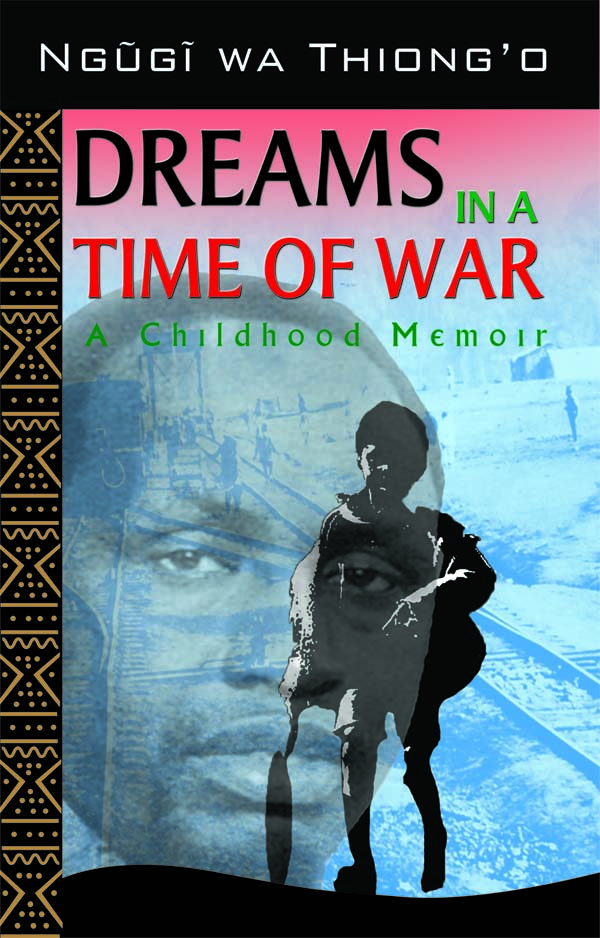
The risk was pronounced by the fact that Kabae, one of Ngugi’s many step-brothers, was now working for the colonial forces as an intelligence officer. A few days after Good Wallace’s visit Kabae also visited to wish Ngugi success, or had he gotten wind of Good Wallace’s visit?
Young as he was Ngugi had to learn to live with the conflicting emotions and contradiction in their large family. After all, this was in 1954, two years after a state of emergency was declared in Central Kenya, thereby marking the darkest period in colonial Kenya.
Ngugi, Kenya’s foremost literary personality, captures these experiences in Dreams in a Time of War: A Childhood Memoir. In this book, Ngugi once again asserts his reputation as a sublime story-teller.
With his creative power, Ngugi transports the reader into the mind of a young boy and lets them see things through the lenses of a child. Here, a child’s innocence and naiveté forms part of the narrative.
Only rarely does the grown-up and intellectually sophisticated Ngugi show his hand, in the narrative, often laced with subtle humour. Just as this is Ngugi-the-child’s show the author, as much as possible, lets Ngugi the child do the narration.
Just as a child’s universe is impressionable and full of imagination, so is this book.
Ngugi’s formative years coincided with the rise of African nationalism, which was informed by the participation of Africans the First and Second World Wars. This is where Africans realised that the white man, just like them, was mortal after all. This, in effect triggered the struggle for equal rights by demobilised African soldiers, who felt cheated after not getting land, like their white counterparts.
Then, Ngugi, in his childish imaginations, pictured the early nationalists in larger-than-life dimensions. To him, people like Harry Thuku, and later Jomo Kenyatta, and Mbiyu Koinange, were mythical, even magical characters.
He for example imagined the Germans, who at the defeat of the Second World War, surrendered to his step-brother Kabae, who had gone to fight, on the side of Britain in far off Burma, among other exotic sounding places.
As for Kenyatta, the author’s adoration for the mythical figure was to turn sour, when the man, as Kenya’s first president, consigned Ngugi to detention without trial, in 1977.
Much has been made about how Ngugi, in this book, has shed off some of his controversial views and opinions, but when you put into consideration that at that age Ngugi had not yet formed those opinions, then critics making those observations are jumping the gun.
By the time this book comes to an end, Ngugi has just stepped into Alliance High School for his secondary education, so you do not expect a person at that stage to know, let alone appreciate, ideologies like Marxism and other controversial ideas that make Ngugi what he is today.
Maybe critics, who have made careers attacking Ngugi’s every move, should practice some restraint and wait for that point when he tells how he came to embrace those controversial ideas, and why, only then can they take him on.
Apart from growing up under the horrors emergency rule, the author had other things to worry about. He for example had to go out in search of jobs in other people’s farms to supplement the little income his mother earned.
This was in addition to the fact that at a tender age Ngugi and his younger brother, Njinju, had to endure the ignominy of being chased away from home by their father to go and join their mother who had earlier escaped her matrimonial home to escape her husband’s beatings.
Maybe as a way of escaping from those difficulties young Ngugi sought refuge in books, and especially the Old Testament, which had the effect of transporting him to an enchanting world away from the reality of his suffering. Thus a long-life bond between him and the written word was formed.
And all this was as a result of a pact he made with his mother to go to school and do his best. “Was that the best you could do?” was the constant refrain from his mother whenever he brought home a result or the other from school. It also served to inspire him to work even harder.
By deciding to write his memoirs in instalments, Ngugi took the risk of turning off readers who might argue that there is nothing spectacular about a book dealing exclusively with one’s childhood.
His life was not much different from other children growing up at around the same time and under the same circumstances. But then, it takes a special writer to turn otherwise mundane details of growing up into a highly readable and entertaining book.
Most readers have a rough idea about Ngugi’s life story. They also know that the more interesting and controversial aspects of his life lie ahead of Dreams, which means that future instalments of his memoirs will be highly anticipated.
Maybe for future instalments, Ngugi’s Local publishers EAEP should consider releasing their local edition at around the same time as the American and British editions. That way, EAEP would take advantage of the international hype created on the book to move more copies.
I decided to retrieve the following comment from the comments section, which is in response to the on going debate on Harare North. I felt that it the merits a post on its own. The author is Prof Maurice Amutabi, who teaches History at Central Washington University in the US. Share your thoughts on the comments section below.
Ngunjiri.
I recently came across a debate on Brian Chikwava’s debut novel Harare North sent to me by Joseph Ngunjiri. The issue at hand was that Brian Chikwava is Zimbabwean and his novel on Zimbabwe had been reviewed by a Kenyan. The quarrel seemed to be that a Kenyan cannot review a novel by a Zimbabwean, objectively. The reviewer Joseph Ngunjiri received a lot of flak and direct negative epithets from some Zimbabweans on the fact that as an outsider, he could review a novel by a Zimbabwean. The debate went even further to suggest that Joseph Ngunjiri’s hatred of Robert Mugabe accounted for his biased review of Brian Chikwava’s novel. Of course, I personally do not like or support Robert Mugabe’s autocratic policies, benign or malignant, but I have reviewed books on Zimbabwe and he has never come between. You cannot force people who do not like Mugabe. Zimbabwe is not a preserve for Zimbabwean scholars only. Jester Phiri and other Zimbabweans are wrong to condemn Ngunjiri for reviewing a novel on Zimbabwe.
Zimbabweans have been crying foul in Botswana and South Africa, for being called ‘foreigners’ or makwerekwere. In fact the concept of Bakwere or Makwerekwere is so disturbing that it is a form of apartheid by black South Africans and Batswana against non South African or non Batswana blacks and I find it utterly disturbing. Makwerekwere was originally used to describe non Tswana speakers, but now applies to Zimbabweans, Nigerians and Kenyans, and other Africans who have arrived in Southern Africa in large numbers in the recent past. I condemn the pigeonholing of Zimbabweans in Southern Africa when they are referred to as Makwerekwere, but find it interesting that Zimbabweans are exhibiting the same xenophobic characteristic which they are condemning. The emergence of hostility among and between Africans is worrying. It is interesting to see the fast rate at which these tags of ‘foreign-ness’ in reference to fellow Africans is increasingly becoming common in discussions in many parts of Africa. in Kenya for example, the hostility against Somali refugees has created negative energy against Kenyan Somali, who are now not differentiated from the ‘wariae’ tag that referred to Somalis on the other side of the border. Today, what used to be called ‘Somali Ndogo’ (small Somali) in many Kenyan towns are forced to endure constant raids by security personnel for illegal immigrants and search for ‘terrorist suspects’. In the past these settlements were regarded as part of Kenya’s urban sprawl, and normal. They were like Kisumu ndogo (little Kisumu) for Luos, Kiambu ndogo (little Kimabu) for Kikuyus, and Keroka ndogo (little Keroka) for Abagusii, and Kakamega ndogo (little Kakamega) for Abaluiyia, Masaku ndogo for the Akamba (founded by second hand Kamba used tire/tyre dealers throughout East Africa), and other ethnicities throughout the country and region.
There is no doubt that there are differences between some African nationalities but when the difference is based on hatred more than unbiased markers of identity, this becomes a point of concern. Why can’t scholars study other countries without being subjected to negative energy? It is quickly appearing as if someone from Kenya cannot study Uganda objectively or vice versa, or that a Tanzanian cannot discuss a Namibian issue or vice versa, impartially. This is negative for scholarship on Africa. It means that very soon, I will be told that I cannot study northern Kenya where the bulk of my research has been conducted on NGOs working among pastoralist, because I am not a pastoralist. This trend is likely to stifle academic freedom and creativity. I recall with nostalgia when in high school in Kenya we read books by writers from across the continent and critiqued them. They allowed us to have a continental perspective. We read Elechi Amadi’s The Concubine, Ngugi wa Thiong’o’s The River Between, Peter Abraham’s Mine Boy, Cheikh Hamidou Kane’s Ambiguous Adventure, Mongo Beti’s The Poor Christ of Bomba, Okot p’Bitek’s Song of Lawino, Cyprian Ekwensi‘s Jagua Nana, among others. These novels did for us what a textbook can never dream of doing.
I am therefore stunned to hear the emergence of ‘space’ and ‘turf’ wars among scholars. Not long ago, I saw the emergence of this wars among scholars in the Diaspora as well. I have been taking students from Central Washington University to Africa and most recently took them to South Africa (Kenya is under State Department advisory and CWU does not allow official travel there by students). I was surprised to receive two clearly hostile messages from two black South African scholars based in the US like myself, criticizing the itinerary of my trips (since rhe syllabus and itinerary was posted online). They were annoyed that I took the students to places they thought were demeaning to the good history of black South Africa. They were unhappy with the fact that I took my students to the Voortrekker Monument Museum, in Pretoria, which celebrates Afrikaner (Boer) history. I have never seen such a biased museum anywhere in the world, and in fact think that Voortrekker Monument is an aberration of the history of South Africa because of some of the lies in the museum. But after visiting the Apartheid Museum in Johannesburg and the Hector Pieterson memorial in Orlando West, Soweto and the Regina Mundi church in Soweto, all of which celebrate Black resistance, I thought it was fitting for the students to visit the Afrikaner monument as well, in order to have a full perspective of what happened in apartheid South Africa. The students could tell the subtle differences in ways in between the places we visited were presented. The point I am trying to make is that as scholars we should be tolerant of others’ views and allow for multiple interpretations, even those we do not agree with.
Another good example of this increasing intolerance is when a non Nigerian scholar, Dr. Saine travelled to Nigeria for few weeks and had the ‘audacity’ to comment about his visit to that populous (although it has never had an official census acceptable to all since independence, so we do not know if it has 90 million or 120 million people) African nation. Dr. Saine received a lot of negative criticism from Nigerian scholars and others, for simply writing about Nigeria. He was attacked by Qansy Salako, Valentine Ojo, Obododimma Oha and Pius Adesanmi. Ed Amatoritsero wrote, “He [Dr. Saine] is a professor who studies Africa but had never been in Nigeria until May of 2009. Then he did visit Nigeria and lived in VI (Victoria Island) – the Island jewel in the midst of Lagosian rot – according to his travelogue. I was in Nigeria at the same period – in May of 2009. I think we must have visited two different Lagos-es.”
Another scholar Dr. Valentine Ojo, MD wrote,
My take on this outburst then and now, was that this is academic violence of the highest order. This is a form of academic gangsterism that is increasingly becoming entrenched in African scholarship and should be condemned. Those who defended Dr. Saine were not spared. They were called names, bad names. One of them was Dr. Kwabena Akurang-Parry whose crime was to say that the he found the article by Dr. Saine to be insightful. Here below is what Dr. Valentine Ojo wrote:
Then Valentine Ojo launched into Kwabena Akurang-Parry for using the word insightful to describe Dr. Saine’s piece.
What bothered me about the attacks was that the Nigerians were undermining Dr. Saine’s report without presenting to us their own reports. It is not different from the attacks on the Kenyan reviewer Peter Ngunjiri, whose crime is that he reviewed Brian Chikwava’s novel Harare North. What one would have expected is a Zimbabwean scholar to point out to a review of the same novel by a Zimbabwean scholar and show the differences that he would have noted. So far, there is no review of the novel by a Zimbabwean. So, does it mean that the rest of the world should just sit and wait until a Zimbabwean reviews the novel?
Below are some of the extracts from the negative exchange on the review of Brian Chikwava’s novel Harare North by Joseph Ngunjiri:
Jester Phiri in Harare writes
I read Ngunjiri’s review of Chikwava’s debut novel, Harare North (October 14, 2009) with some irritation. It seems to miss the essence of a remarkable novel, pioneering in style and innovative in content.
Is Ngunjiri confusing his obvious distaste for Zimbabwe’s government with a novel that at least tries to deliver the realities of a country in turmoil? Or is he trying to get one up on the Zimbabwean writer? Is it possible for a Kenyan reviewer to fully appreciate what Chikwava has accomplished in telling the ‘Zimbabwean story’?
The Editor responds
To paraphrase a Kenyan novelist Ngunjiri might well say “I write what I like”. Is it not, after all, interesting to have an African perspective on a Zimbabwean novel?
• Saturday, 15 May 2010 09:48 posted by Joseph Ngunjiri
I think Jester Phiri misses the point when he claims that I am trying to get one up on Brian Chikwava. Why would I do that? And who says that I have an “obvious distaste” for the Zimbabwean government, which, he rather testily says I confuse the novel?
Why is Phiri being so defensive – on behalf on the author? His is a case of if you don’t like something, give it a bad name, or worse kill it – does that remind you of Mugabe? – Fact is you cannot divorce Harare North from issues surrounding Mugabe’s ZANU-PF, and the question of exile.
About whether a Kenyan can “fully appreciate” the “Zimbabwean story”, all I can say is we are now living in a globalised world, and oh, Chikwava is now a global citizen
Harare North revisited
Hi there,
Yesterday I blogged about Marimba Media, the new Pan African arts journalist platform, which, to all you art lovers, promises to be an exciting forum where you can interact with cutting edge arts reporting from some of the best arts journalists across the continent. While I pointed you to the review I did on Brian Chikwava’s debut novel Harare North. I would also like to draw your attention to what promises to be a lively debate on whether a Kenyan is qualified to review a book that addresses the Zimbabwean situation. You can follow the debate here, and if you feel like making a contribution, you have to log in first by creating an account.
All the best.
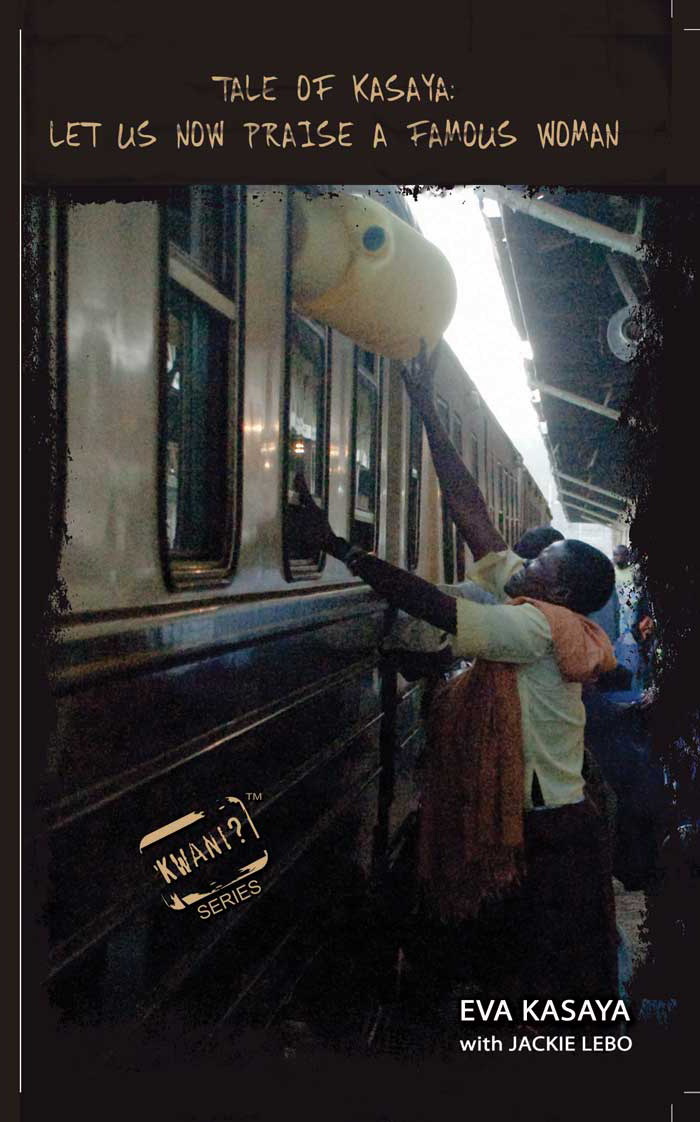
So you have that house girl and you have been mistreating her. Are you that man who steals into the househelp’s panties when the missus is asleep? You thought that you would get away just because you fired her, and that she will keep quiet about it. Well, you’ve got another thought coming. Yes, your days are numbered…
Soon, house-helps will be telling their stories and exposing what a bad society we live in. They will reveal all and you will have nowhere to hide, nowhere!
And I am not talking about the future here. I am talking about Eva Kasaya, who felt that she needed to tell the story of her life as a house-help. Read on…
House-helps occupy a parallel space in society, where their services are much sought after, yet they are rarely appreciated.
Little wonder then that you will always hear employers bad-mouthing them, yet they readily acknowledge that they cannot do without them.
To appreciate how lowly most employers rate their house-helps, you only need to read in the media how they get routinely mistreated. The most recent case that comes to mind is the Kenyan girl, who was thrown from a storied building in Saudi Arabia, by her employer.
Yet, in all these instances, no one, apart from close relatives and friends, bothers to listen to their side of the story. Well, one former house-help has sought to change all that and has actually penned down the story of her life.
And you can trust Kwani Trust, who are always experimenting with different styles of writing, to be the ones to publish the book. Tales of Kasaya: Let us now Praise a Famous Woman, is a book that will probably get other house-helps rushing to tell their stories.
And if Eva Kasaya’s life story is anything to go by, boy do house-helps have stories to tell? “It is apparent that you have quite some information, only that you lack an audience,” thus goes a popular Kikuyu saying that would readily apply to Kasaya and any other house-helps out there who would be willing to pour out their hearts.
Told in the first person, Tales of Kasaya puts the reader in the turbulent world of house-helps. It is rendered with the freshness and simplicity of an impressionable village girl. Like most house-helps will testify, circumstances beyond their reach, mostly poverty back at home, lead them to take up such jobs.
Kasaya, who hails from Maragoli could not continue with her education beyond primary school, as her peasant parents could not afford it. After a stint as a house-help back in her rural home, she thought is was time she upgraded and sought employment in the big city of Nairobi. Her adventurous trip to Nairobi is a must-read for every person has a house-help. So are the trials and tribulations she undergoes from one employer to the other.
While the book makes for interesting reading, I am not sure about the bit about praise for a famous woman. Clearly, there is nothing in the narrative to make one think of the narrator as a famous woman.
UPDATE: A newer edition of the book was released with a changed title: Tale of Kasaya
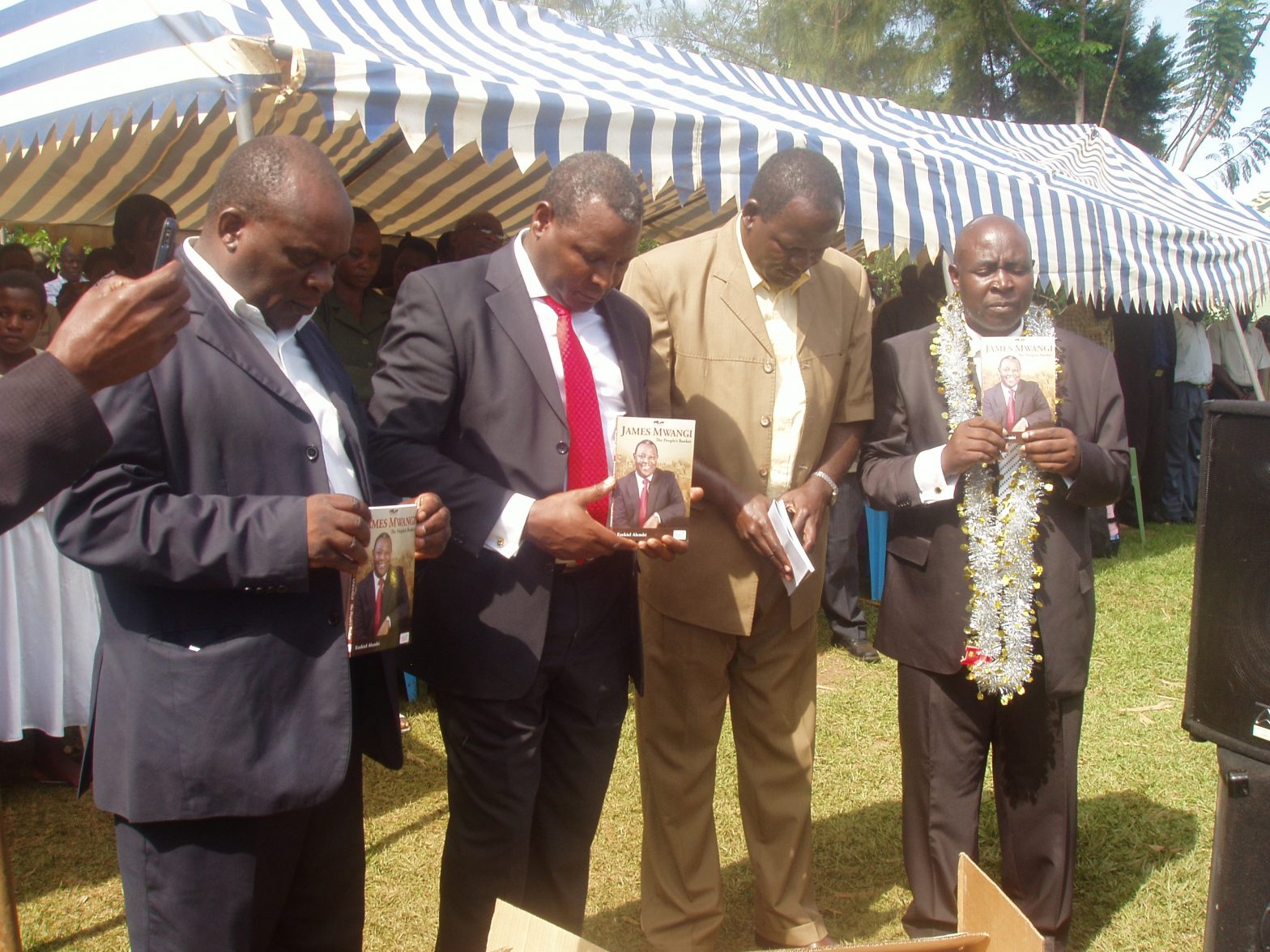
Having a relative in Europe or in the US is normally a source of pride for many families, particularly in Africa. This is reinforced by the fact that these relatives occasionally send much needed money back home.
To these people it does not matter what their loved ones do out there as long as the funds keep flowing. In her book Eyo, Nigerian author
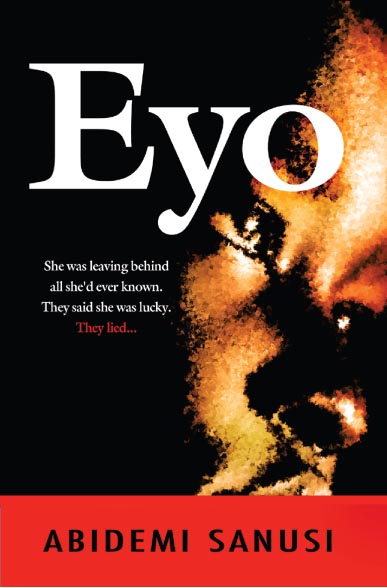
Abidemi Sanusi addresses an issue many African families, with relatives abroad, would rather not talk about. In fact human trafficking and child prostitution is an issue many governments are very shy to talk about.
Eyo is the name of a 12-year-old illiterate Nigerian girl, who is taken to the UK with promises of a good job and education. For a girl used to hawking ice water in the heat and sun of Lagos streets, this would seem like a dream offer, right?
Wrong. Eyo would rather she remains in the lawless Ajegunle Slum than leave her four-year-old sister Sade in the amorous hands of her father. There is a secret understanding between Eyo and her father that he would only leave Sade alone if she continues to satisfy his sexual needs.
She lands in the UK and into the hands of a Nigerian couple Sam and his wife Lola. While the couple has no problems having Eyo take care of their children, who are almost Eyo’s age, they are also not averse at turning her into their punching bag. That’s not all. Sam seems to have found a source of relieving his perverted sexual desires.
He, in the process, discovers Eyo’s ‘expertise’ learnt through her father back in Nigeria. It is this expertise that makes the poor girl a favourite at Big Madame’s – another Nigerian – brothel among clients looking for ‘special care’. This is after Sam is finished with her.
Eyo eventually ends up prowling the streets, trading in her body under the watchful eyes of Johnny, yet another Nigerian, her abusive boyfriend cum pimp.
When Eyo is finally rescued from the streets and taken back to Nigeria, she discovers to her horror that her father eventually made good his threat of turning Sade into his sexual object, the moment she left for the UK. The mother knows this all along but will not do anything about it as it is the duty of a woman ‘to endure’.
Abidemi admirably uses fiction to open the lid on the sensitive subject of human trafficking and more so child prostitution. Today, it is an open secret that child prostitution rings continue thrive worldwide, while authorities continue to look the other way.
Through her narrative style the author manages to bring out the readers’ anger at the cruelty of it all. However, as the story unfolds the anger paves way for helplessness. The helplessness starts creeping in as it gets increasingly apparent that the perpetrators of this vile trade are getting away easily. The fact that they are able to manipulate the law to their benefit goes to show child prostitution is not about to be brought to an end.
The book ends on a rather dark note as Eyo, faced with despondency and poverty back in Nigeria, considers going back to the UK and back to prostitution. Perhaps this is the author’s way of saying that the African girl child will continue to be an endangered species for a long time to come.
Eyo has been nominated for Best Book in the 2010 Commonwealth Writers Prize.
The book is published by WordAlive Publishers
Following the release of my book Henry Wanyoike: Victory Despite Blindness I am glad to announce that it has received its first review, mostly positive, in the Sunday Nation of October 25, 2009. The review was done by Ng’ang’a Mbugua, a journalist with Daily Nation. He is also a published author with several titles to his name. They include Mwai Kibaki: Economist for Kenya, Catherine Ndereva: Marathon Queen, among other. His latest offering is Terrorists of the Aberdare, a novella, which he has self-published. I hereby include an excerpt of the review.
Ngunjiri’s book, however, is distinguished by the fact that he is among the authors in the series who wrote his book with the full co-operation of their subjects, which cannot be said of some of the earlier biographies. And for that, the book is rich with insights that would otherwise have never made it to the public domain.
You can read the rest of the review here.
Remember, you can order it here
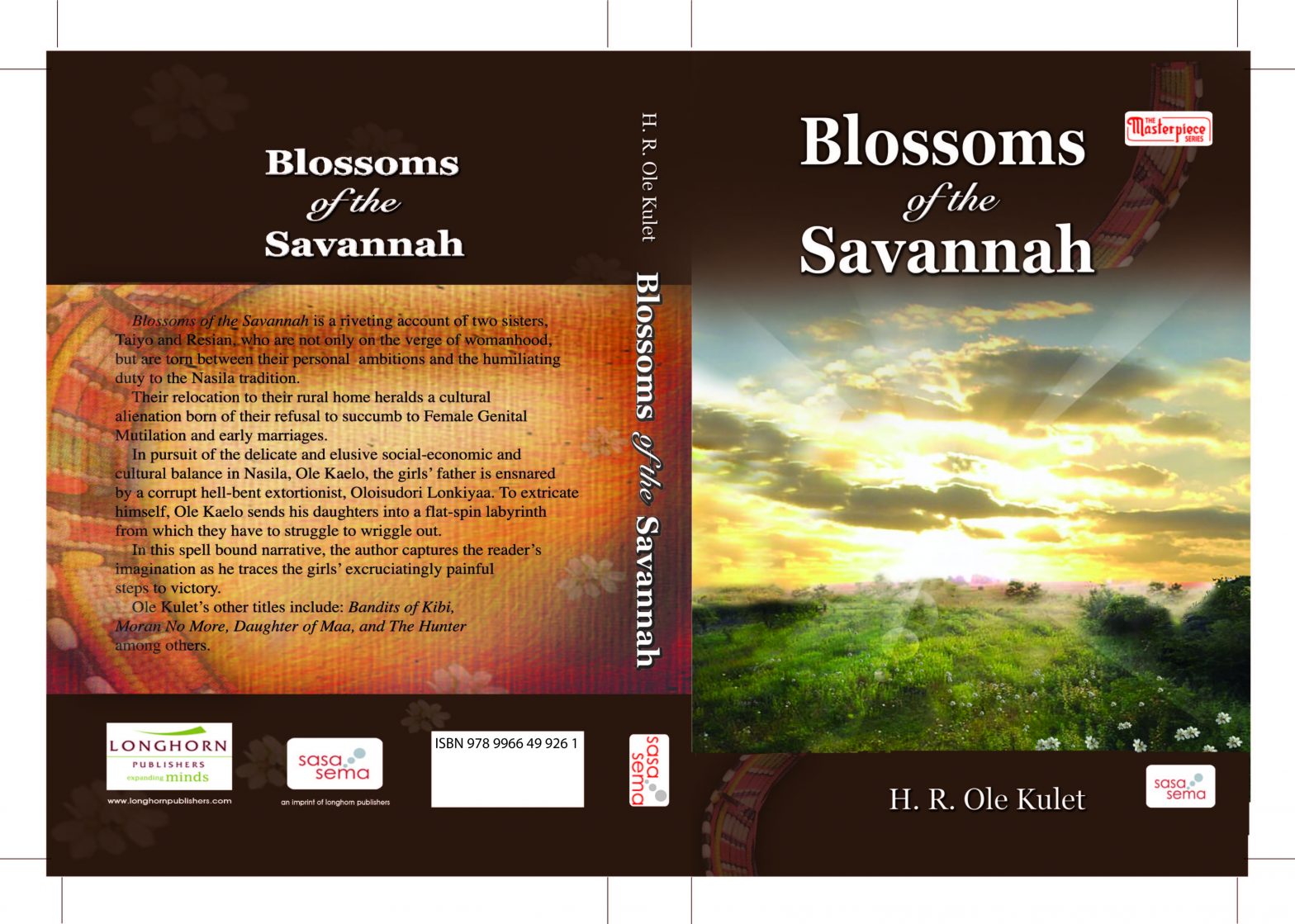
Henry ole Kulet’s book won the 2009 Jomo Kenyatta Prize for Literature. Yours truly had reviewed the book way back in May. I hereby share the review with you:
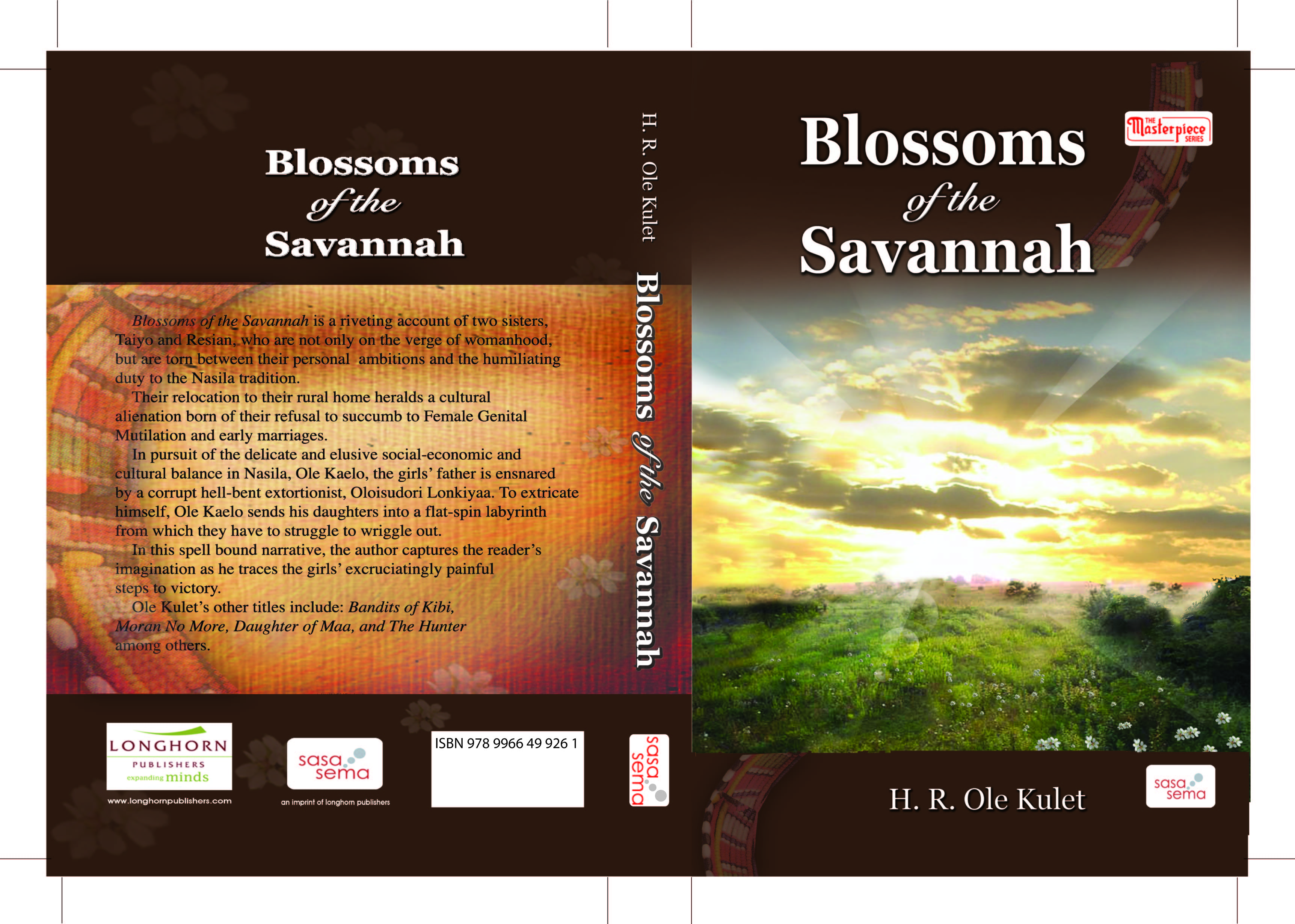
After a long absence from the literary scene Henry ole Kulet is back, this time with Blossoms of the Savannah. This novel mainly dwells with the touchy issue of Female Genital Mutilation (FGM).
Now, FGM or female circumcision, remains a very sensitive topic particularly considering that there are powerful lobbies committed to ensuring that this practice is brought to an end. The issue is complicated by the fact that it involves a people’s culture, a culture that has been practiced since time immemorial. Despite the best of efforts from these lobbies and the government, getting to end the practice has largely remained elusive. Well, you do not just wake up one morning and decide that you are going to away with a particular aspect of culture and hope to succeed.
However, as much as culture defines a people’s identity, some cultural aspects have proved more harmful than beneficial. Still modern realities do not support such practices. For example, the probability of contracting diseases like HIV/Aids, arising from the sharing of blades, does not bode well for FGM.
Cases have also been documented where young girls have lost their lives following complications arising from the procedure.
In his book, Ole Kulet treats the issue of FGM in a sober and balanced manner.
He does not approach FGM in the needlessly confrontational style, often associated with the lobbies. He instead delves into the Maa traditions and demonstrates how important they are to the community.
The story revolves around the family of Ole Kaelo, who finds himself retrenched from his job and opts to relocate his family from Nakuru to Nasila, his ancestral home.
Just like any other retrenched person, he sees his survival, and that of his family, coming from venturing into business.
His two teenage daughters, Taiyo and Resian however do not share his enthusiasm. Their sudden removal from the urban setting in Nakuru to village life does not sit well with them.
They are also not certain of their prospects of furthering their education at the university.
Having been brought up in a modern lifestyle, they are mainly pre-occupied with their education, which they feel would assure them of a better life in future.
They are however in for a rude awakening. No sooner have they landed in the village than word goes round to the effect that they are yet to undergo the ‘cut’. At 18 and 20 the two sisters are already late for the cut, according to the Maa culture.
In spite of their physical maturity, they are contemptuously referred to as intoiye nemengalana, derogatory for girls who have not undergone the rite.
Their problems are far from over. Their worst nightmare yet comes in the form of Oloisudori, an evil businessman who now has their fate in his hands, thanks to a foolish deal their father entered with him.
Unknown to his family, Ole Kaelo had borrowed money from Oloisudori, which he used to establish his business. It so happens that on a visit to Ole Kaelo’s home, Oloisudori sets his eyes on Resian the younger of the sisters. He lusts for her and an idea hits his brain that he could take her for a wife.
Seeing as he might encounter difficulties in convincing the father to give out his daughter to him, he resorts to blackmailing the poor man. Either Ole Kaelo give him his youngest daughter or he recalls his debt, which includes the house he constructed.
Ole Kaelo opts for what he sees as the easier way out and agrees to pawn his daughter to save his business.
Just like other men in Nasila, Oloisudori would not marry a girl who has not undergone initiation, so he arranges for her to get cut first.
Luckily for Resian, Olarinkoi, a man who had been hanging out in their house, is at hand to ‘rescue’ her. He promises to take her to Emakererei, a woman who gives refuge to girls being threatened with the harmful practice.
Resian falls for his story and accompanies him to her ‘savior’. More shock awaits her as the man has his own evil designs on her. Like Oloisudori, Olarinkoi also wants to forcibly circumcise her and marry her.
Eventually, Resian escapes and finds her way to Emakererei, where her dream of going to university is assured. Her elder sister Taiyo is not as lucky. She is tricked and is forced to undergo the cut. Apparently, after losing Resian, Oloisudori decides to take Taiyo instead. In spite of Taiyo’s tragedy, both girls end up in the safe hands of Emakererei.
Blossoms of the Savannah has echoes of Ngugi wa Thiong’os The River Between, where two sisters are faced with an almost similar dilemma.
Muthoni opts to get circumcised but dies in the process. Muthoni’s death is interpreted as Ngugi’s way of saying that female circumcision is outdated.
Ole Kulet’s narrative is enriched with the description of the various aspects of the Maa culture. In the book, Ole Kaelo comes out as a pretty confused character. His wife does not help matters either. Instead of standing out for her daughters, she just runs along with her husband, content with protecting family property.
In spite of its obvious harmful effects, FGM refuses to die, as the lobbyists would expects it to. Could it be that their approach to the whole issue is wrong?
You can order the book online on www.enrakenya.com

